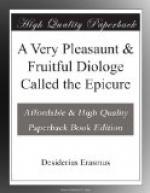requireth of his elect & faithfull seruautes, euen
too haue his lytell flocke knowe his blessed woorde,
whiche woulde bee muche better knowe & more thankefulli
receaued, yf al agees and degrees of men with one
mynd, wyll, & voice, would nowe drawe after one lyne,
leauyng their owne priuate affections, and shewe theim
selues euer vigilant, prompt, & ready helpers & workers
with God, (accordynge to the councell of sainct Paule)
& especially priestes, scolemaisters & paretes, which
accordyng too ye Prophete Dauid are blessed, if they
gladly requite ye lawe of God. They shuld therfore
reade ye bible & purdge theyr mindes of al papistry:
for theyr || necligence, in dooyng their duties &
slugishnes toward ye blessed woord of god, dooeth too
muche appere. Through them forsoth the gospel
of Christ shuld bee most strongely warded and defended,
for almost all the Prophetes, and a great parte of
the scripture beside teache them their duties, and
shew playnely what maner of men they shulde bee:
Yea, and how greuously the holy Prophetes crie out
vpon false and ignoraunt priestes, the thyng is very
euident. But through the helppe of God all those
that be ignoraunt, or els learned (as they take them
selues) wyll leaue of, and repent them of their wicked
and obstinate blyndnes, and bowe them selues with
all oportunitie too draw mens heartes too the holy
testament of God: consideryng, that in the terrible
day of iudgement, euery ma shall yeoue accompte of
his Beliwicke, where neither ignorauce shall excuse
vs, ne yet any worldly pope may defed vs. Most
happye the shall they bee, whiche haue walked iustely
in the sight of the Lorde, and ||B.iii.|| that haue
syncerely preached his testament and lyuely woord
withoute flattery or iuggelyng: Yea, and in that
fearful day, all they (as writeth S. Augustine) shal
fynde mercie at the handes of god, whiche haue entised
and allured other vnto goodnes and vertue. Weiyng
this with my self, (most excellent, and vnto all kynd
of vertues most propt & prestat Prince) I thought
it good too translate this Dialoge, called the Epicure,
for your grace: whiche semed too me, too bee
very familiar, & one of ye godliest Dialoges that any
ma hath writte in ye latin tong. Now therfore
I most humili praie, that this my rude & simple traslation
may bee acceptable vnto your grace, trustyng also
that your most approued gentilnes, wil take it in
good part. There as I doo not folow ye latyn,
woord for woord, for I omytte that of a certaine set
purpose.
Your humile seruaunt, Philyppe
Gerrard, groume of your
graces Chambre.
* * * * *
The interlocutours
{HEDONIVS} {SPVDEVS}




